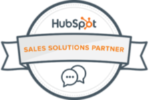Reporting & Dashboards
Lead Management
Assign Tasks
Contact Management
Email Tracking
Mobile Version
What is CRM?
The goal of implementing a CRM is to create a system that your sales and marketing teams can use to more efficiently and effectively interact with prospects or customers.
Marketing will often use a CRM to ensure that they’re passing the right leads to their sales team — a key aspect of developing a strong relationship with the sales team.
Salespeople utilize the CRM in a different way. They use it to source prospective customers, communicate with them, and track their interactions over time. Having the entire prospect history in one place increases their efficiency and improves their productivity. For instance, salespeople using a CRM won’t have to hunt through their email to remember where a conversation left off.

Unlock the Full Potential of HubSpot Sales
We are a certified Sales Solutions Partner with HubSpot. Contact us to learn more about HubSpot Sales and CRM to increase your sales capacity and procedures.

We implemented a HubSpot Sales Software solution for
Specified Lighting Systems to manager their pipeline.
Do you have a need for maintaining a central list of information on your leads and customers? Does this information live in many different places?
Are your customers regularly interfacing with multiple people on your team? How does everyone keep track of where the conversation with any one customer left off?
Do you struggle to understand the productivity of your sales team? Does your sales team follow a structured process?
There are many things a CRM can do that should get marketers, salespeople, or business owners pretty excited! Here’s how a CRM can make you a more effective marketing and sales machine.
